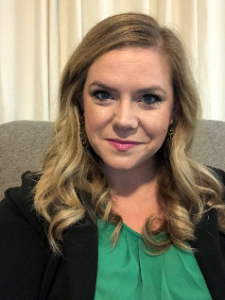
Brianna Garrison
Every year, the Hogg Foundation gives the Frances Fowler Wallace Memorial Award for Mental Health Dissertation Research to eligible doctoral candidates at institutions of higher education in Texas. Awardees receive a scholarship to help cover research-related expenses.
One of our 2020 recipients is Brianna Garrison, MSW Program Director at Baylor University’s Diana R. Garland School of Social Work Houston Campus. Garrison is a licensed clinical social worker and board-approved clinical supervisor. We recently talked with Garrison about her current research, which focuses on caregivers of persons living with dementia.
Your project explores the contextual realities of dementia culture in the social networks of faith communities from the caregiver perspective. What led you to take a professional interest in this topic, and what questions are you trying to answer with this research?
In my clinical practice, I encountered many caregivers of persons living with dementia who were experiencing social isolation after their inability to continue to engage in regular faith community activities due to either the progression of their loved one’s dementia or difficulty accessing faith community services while also being a primary caregiver. I began to dig into the research as a practitioner and found how religion and spirituality supported coping for caregivers, but knew from my clinical practice that many caregivers were experiencing grief and loss directly related to their faith community. I am attempting to find out what social networks of faith communities provide caregivers, what impact do faith communities have when they remain involved and active in the caregiver’s life, and where are the opportunities for mental health professionals to partner with local faith communities to support the needs of persons living with dementia and their caregivers.
How do you think your research methods and approach will help you answer the questions you’re posing?
I think taking a mixed methods approach allows me to gain both a broad view of the caregiver experience and an in-depth account of their experience through qualitative interviews. I have already acquired such rich stories from caregivers that I truly believe will help inform faith communities on the needs of caregivers while also providing a framework for a model that works well to support caregivers.
What, from your perspective, is the biggest area of need — or the greatest opportunity — related to this topic? In other words, how could we really move the needle on this front?
I think the greatest opportunity we have is for mental health professionals and organizations to partner with faith communities to provide education and support to equip them in their efforts to support caregivers. Many older adults are more comfortable seeking support from their faith community and faith leaders than local social service organizations, so there is an opportunity for collaboration in order to have the maximum impact on this population. My biggest hope is to reduce social isolation for persons diagnosed with dementia, at risk for dementia, and caring for someone living with dementia.
Can you suggest a few readings/resources for those who are interested in learning more about this topic?
Dudley, J. (2016). Spirituality Matters in Social Work: Connecting Spirituality, Religion, and Practice. Routledge.
Koenig, H. (2011). Spirituality and Health Research: Methods Measurement Statistics and Resources. Templeton Press.
Myers, D. R., Lawrence, S., & Jones, V. (2013). Will You Care with Me? Congregational responses with impoverished older persons. Social Work and Christianity; Botsford, 40(4), 460–478.
Oxhandler, H. K., Pargament, K.I., Pearce, M.J., & Vieten, C., Moffatt, K.M. (In press). The relevance of religion/spirituality to mental health: A national survey of current clients’ views. Social Work.
Wolfer, T.W., Myers, D.R., & Hogan, M. Health promotion and risk reduction in congregations (2017). Encyclopedia of Health and Risk Message Design and Processing, University of Oxford Press.
